Publications
Highlights
For a full list see below or go to Google Scholar.
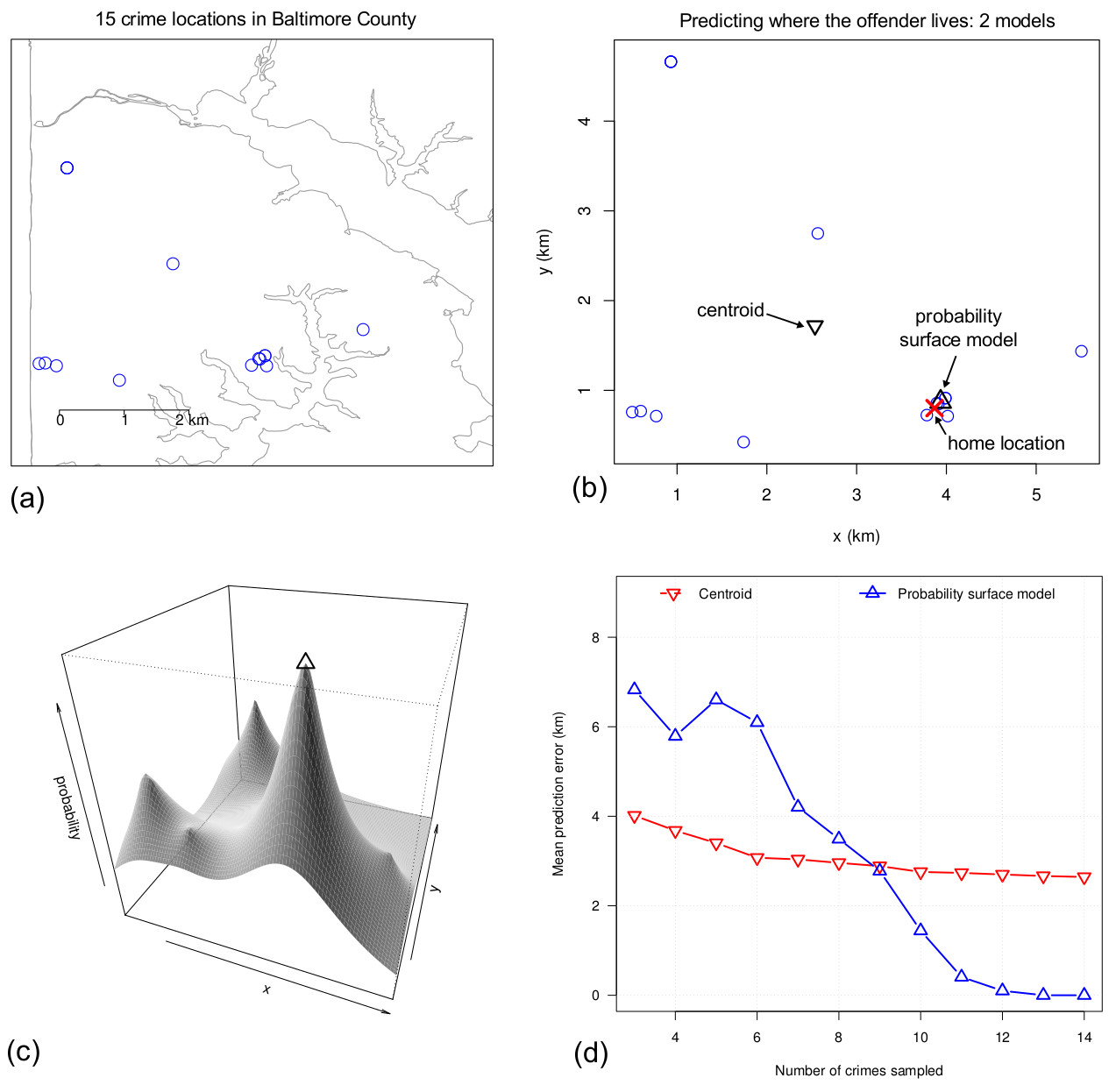
If we reassess the rationality question under the assumption that the uncertainty of the natural world is largely unquantifiable, where do we end up? In this article I argue that we arrive at a statistical, normative, and cognitive theory of ecological rationality. The main casualty of this rebuilding process is optimality. Once we view optimality as a formal implication of quantified uncertainty rather than an ecologically meaningful objective, the rationality question shifts from being axiomatic/probabilistic in nature to being algorithmic/predictive in nature. These distinct views on rationality mirror fundamental and long-standing divisions in statistics.
Brighton, H. (2019)
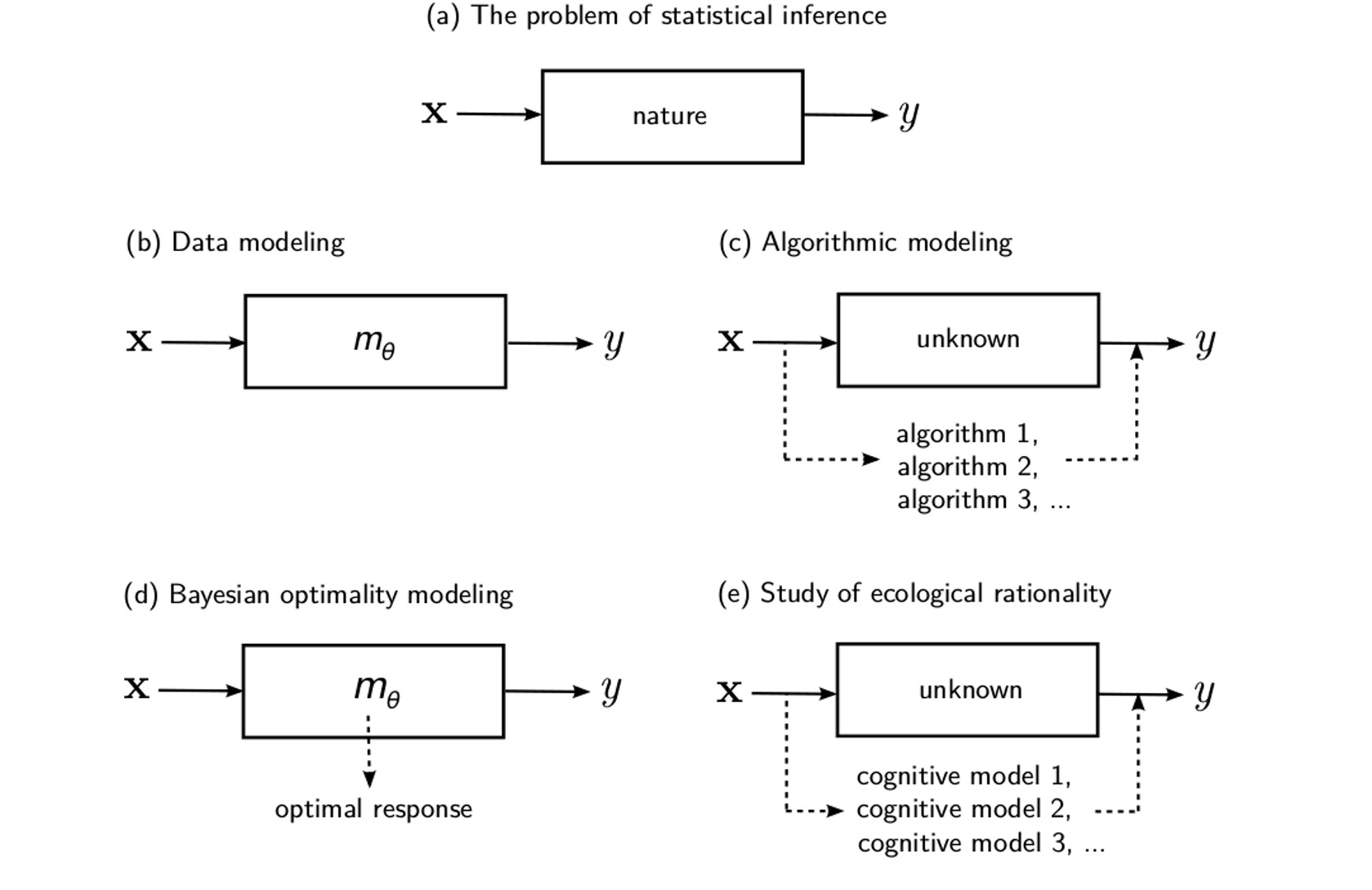
Ecological rationality provides an alternative to the view that rational responses to environmental uncertainty are optimal probabilistic responses. In this article I respond recent critiques by clarifying that ecological rationality is more than a set of algorithmic conjectures. It is also driven by statistical commitments governing the treatment of unquantifiable uncertainty.
Brighton, H. (2018)
Preprint: PsyArXiv (To appear in: Routledge Handbook of Bounded Rationality)
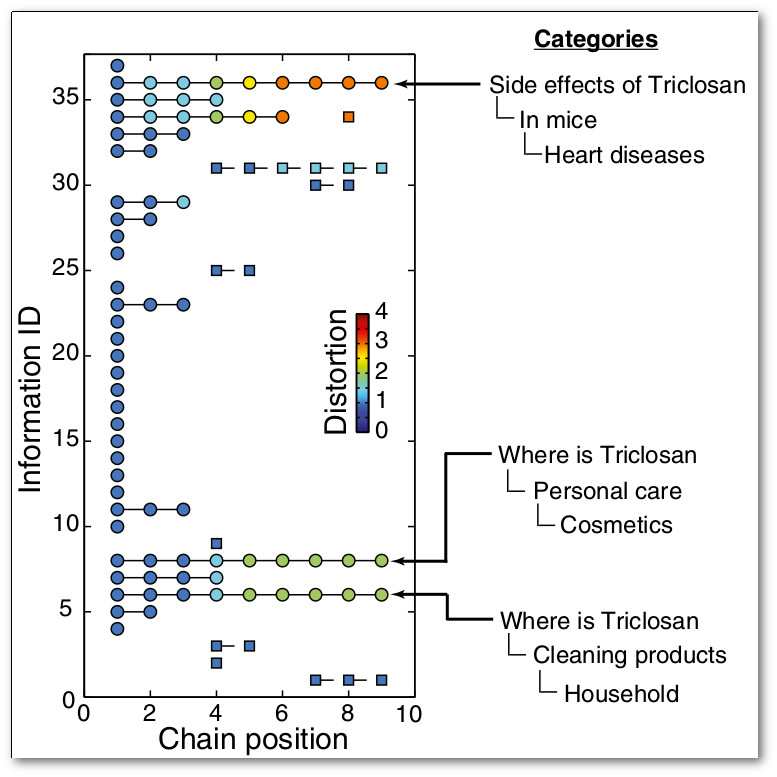
Public risk perception of hazardous events such as contagious outbreaks, terrorist attacks, and climate change are difficult-to- anticipate social phenomena. It is unclear how risk information will spread through social networks, how laypeople influence each other, and what social dynamics generate public opinion. In this article we examine how messages detailing risks are transmitted from one person to another in experimental diffusion chains and how people influence each other as they propagate this information.
Moussaïd, M., Brighton, H., & Gaissmaier, W. (2015)
Proceedings of the National Academy of Sciences of the USA, 112(18), 5631-5636.
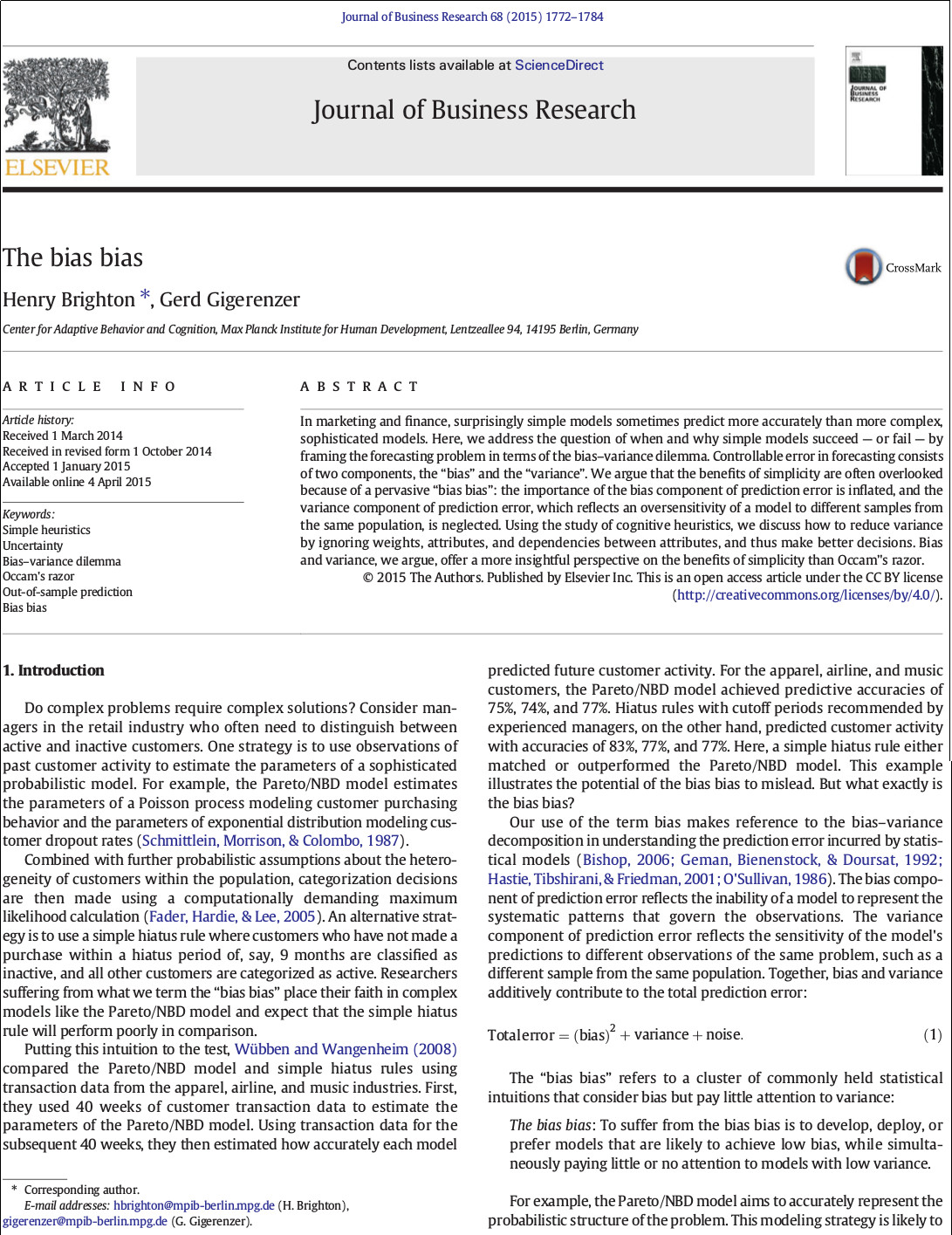
Surprisingly simple models sometimes predict more accurately than more complex, sophisticated models. Here, we address the question of when and why simple models succeed — or fail — by framing the forecasting problem in terms of the bias–variance dilemma. Controllable error in forecasting consists of two components, the “bias” and the “variance”. We argue that the benefits of simplicity are often overlooked because of a pervasive “bias bias”.
Brighton, H. & Gigerenzer, G. (2015)
Journal of Business Research, 68, 1772-1784.
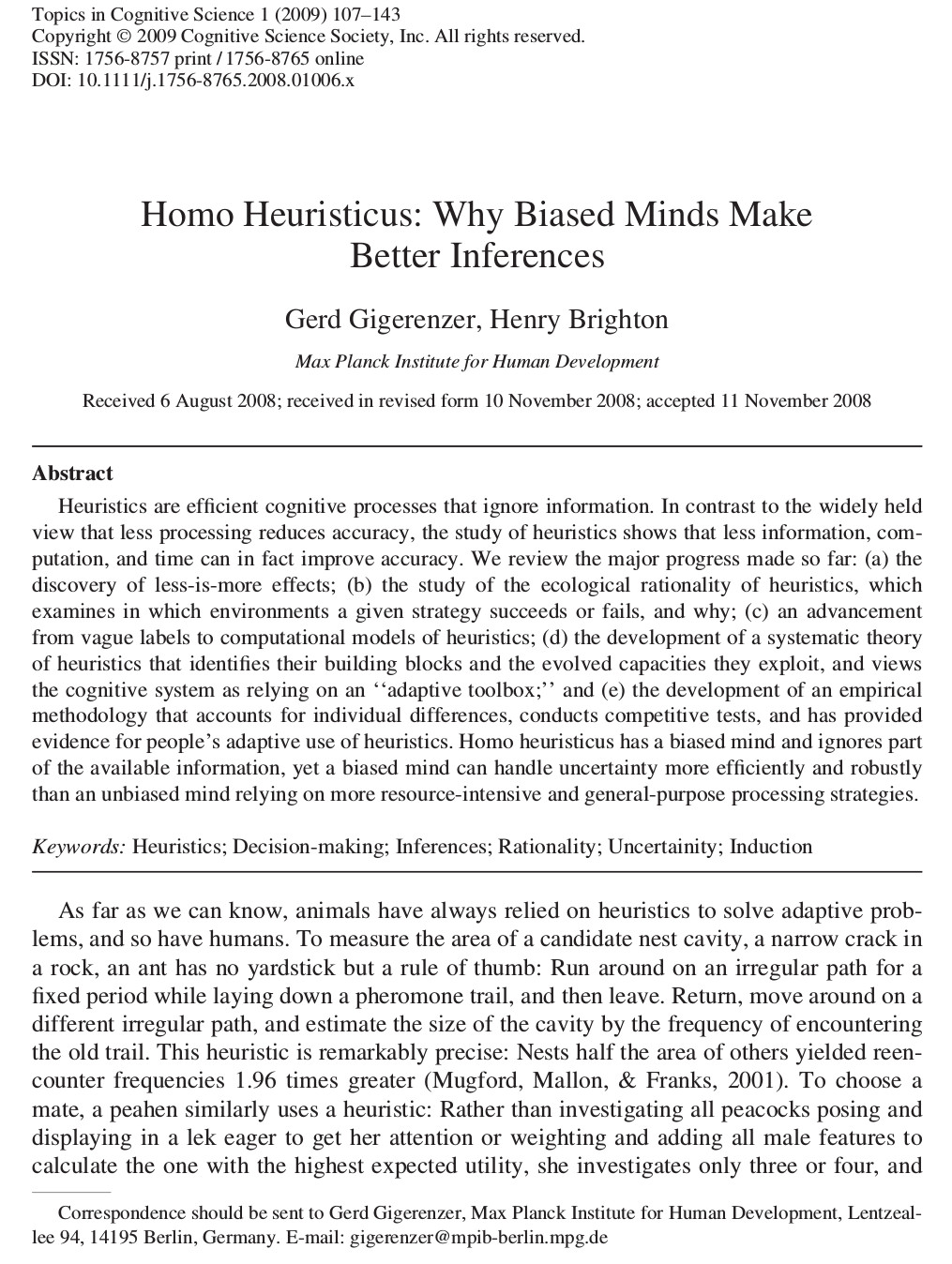
In contrast to the widely held view that less processing reduces accuracy, the study of heuristics shows that less information, com- putation, and time can in fact improve accuracy. We review the major progress made so far and argue that Homo heuristicus has a biased mind and ignores part of the available information, yet a biased mind can handle uncertainty more efficiently and robustly than an unbiased mind relying on more resource-intensive and general-purpose processing strategies.
Gigerenzer, G. & Brighton, H. (2009)
Topics in Cognitive Science, 1, 107-143.
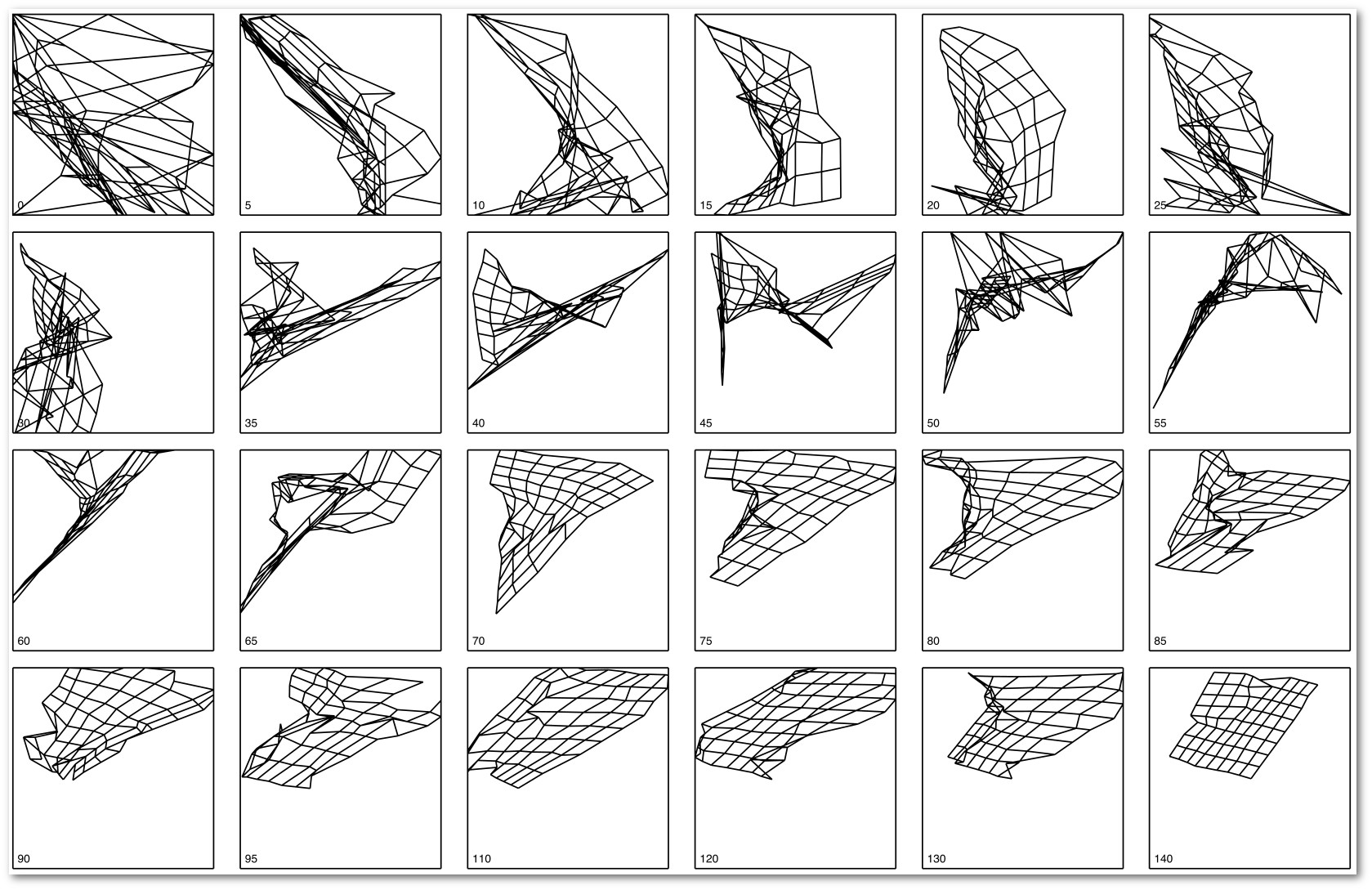
We show how cultural selection for learnability during the process of linguistic evolution can be visualized using a simple iterated learning model. Computational models of linguistic evolution typically focus on the nature of, and conditions for, stable states. We take a novel approach and focus on understanding the process of linguistic evolution itself.
Brighton, H. & Kirby, S. (2006)
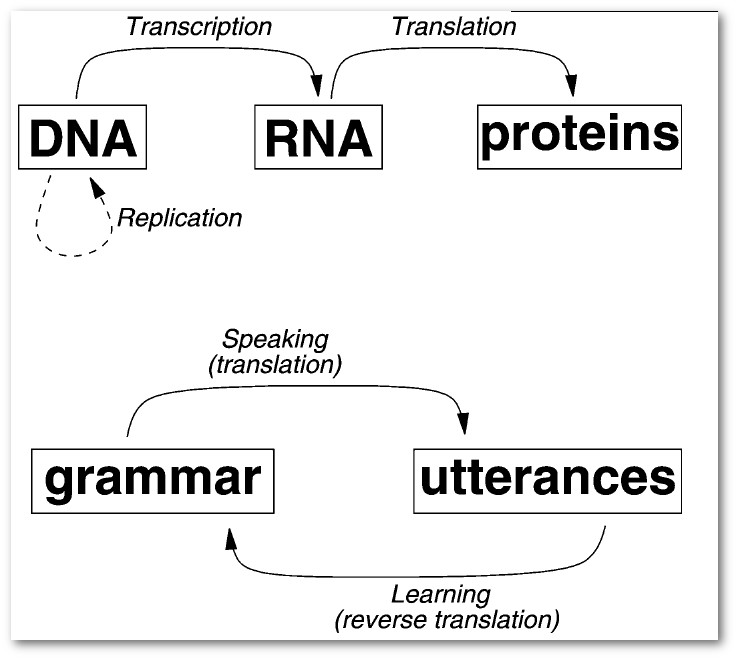
In this article we develop the theory that language codes information about it’s own structure, and as a result, languages themselves provide information that influences their own survival. To understand the consequences of this theory we discuss recent computational models of linguistic evolution. Linguistic evolution is the process by which languages themselves evolve.
Brighton, H. Kirby, S. & Smith, K. (2005)
Physics of Life Reviews, 2, 177-226.
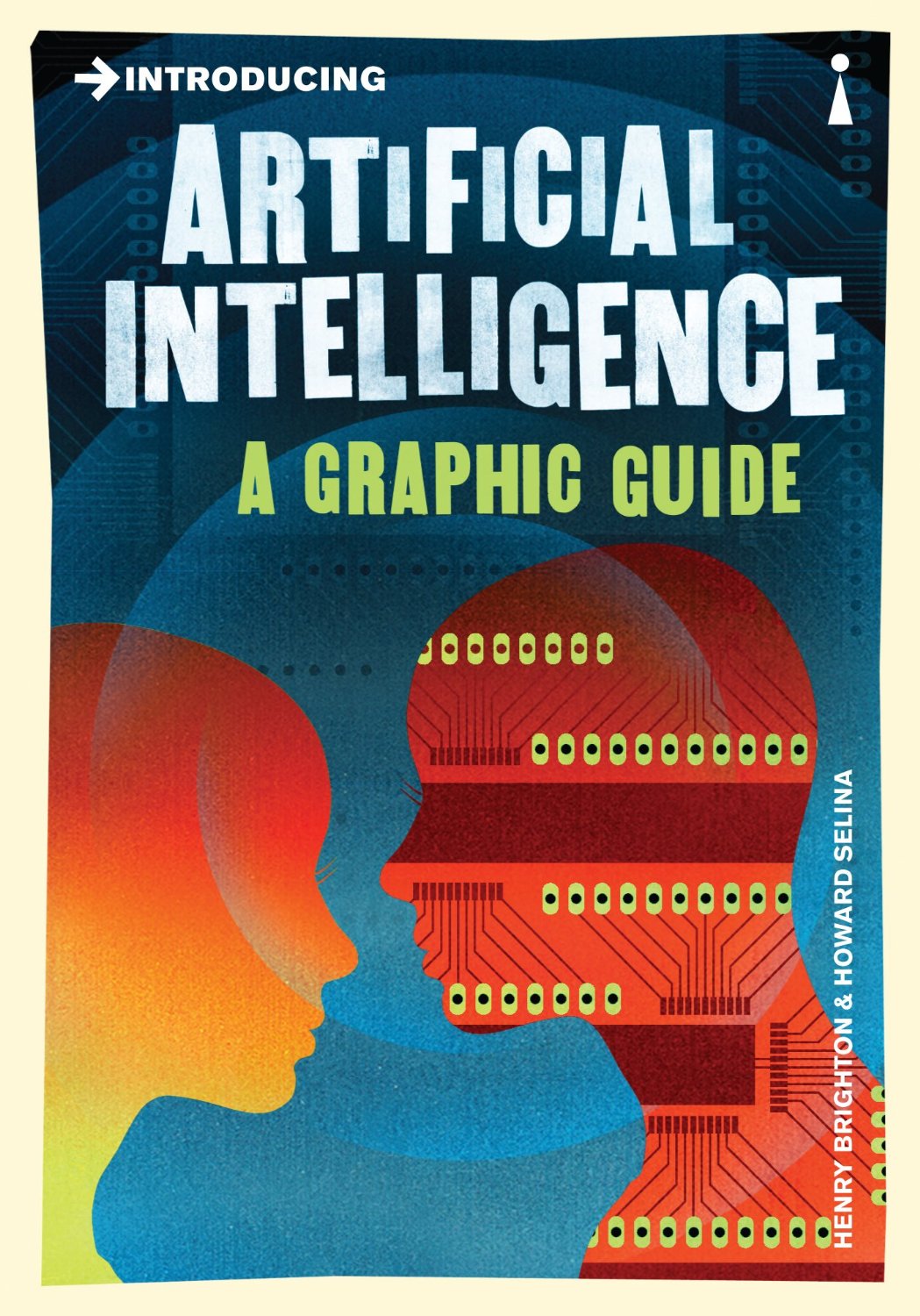
Can machines really think? Is the mind just a complicated computer program? Introducing Artificial Intelligence focuses on the major issues behind one of the hardest scientific problems ever undertaken. Half a century of research into the construction of intelligent machinery has resulted in machines capable of beating the best human chess players and humanoid robots that can walk and interact with us. How exactly should we go about building an intelligent machine? Should it work like a mind? Should it work like a brain? Does it require a body?
Brighton, H., & Selina, H. (2003)
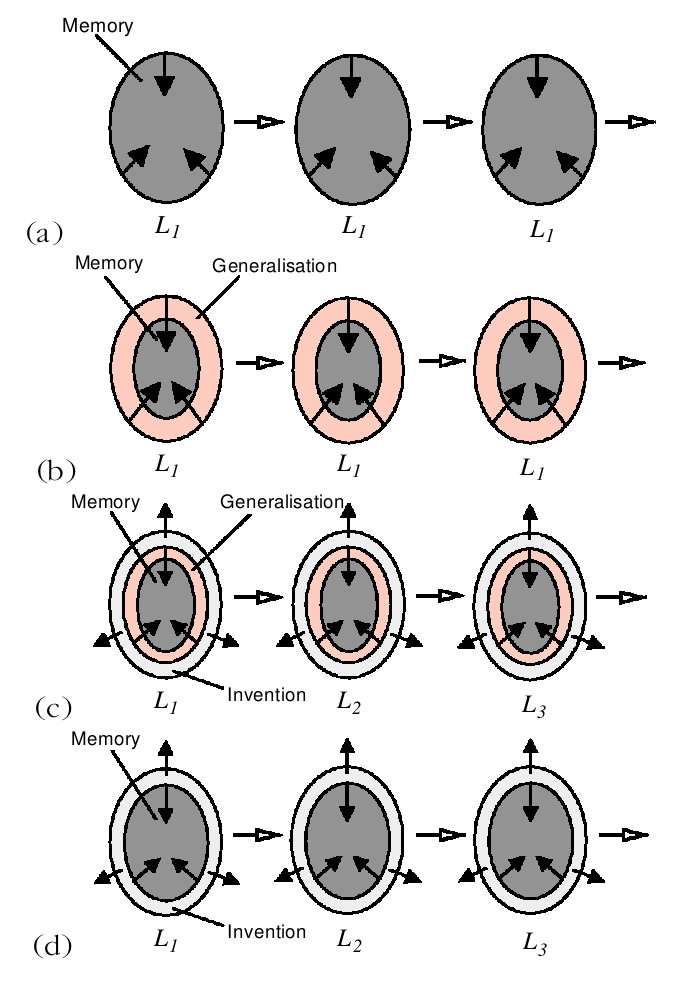
Knowledge of language is complex, yet the data available to the language learner are sparse. This incongruous situation, termed the “poverty of the stimulus,” is accounted for by placing much of the specification of language in the LAD. The assumption is that the characteristic structure of language is somehow coded genetically. The effect of language evolution on the cultural substrate, in the absence of genetic change, is not addressed by this explanation. We show that the poverty of the stimulus introduces a pressure for compositional language structure when we consider language evolution resulting from iterated observational learning.
Brighton, H. (2002)
Full List
Beyond quantified ignorance: Rebuilding rationality without the bias bias
Brighton, H. (2019)
Economics Discussion Papers, No 2019-25, Kiel Institute for the World Economy [Open for public peer review at Economics E-Journal].
Rationality without optimality: Bounded and ecological rationality from a Marrian perspective
Brighton, H. (2018)
Preprint: PsyArXiv (To appear in: Routledge Handbook of Bounded Rationality)
Building the theory of ecological rationality
Todd, P. M., & Brighton, H. (2016)
Minds and Machines. doi:10.1007/s11023-015-9371-0
The amplification of risk in experimental diffusion chains
Moussaïd, M., Brighton, H., & Gaissmaier, W. (2015)
Proceedings of the National Academy of Sciences of the USA, 112(18), 5631-5636.
The bias bias
Brighton, H. & Gigerenzer, G. (2015)
Journal of Business Research, 68, 1772-1784.
L’intelligence artificielle en images
Brighton, H. & Selina, H. (2015)
Paris: EDP Sciences
Entendendo Inteligência Artificial
Brighton, H. & Selina, H. (2014)
São Paulo: LeYa Brazil
Die Zukunft der Diagnostik: Von Optimierung zu Satisficing
Brighton, H. (2013)
In: G. Gigerenzer & J. A. Muir Gray (Hrsg.) Bessere Arzte, bessere Patienten, bessere Medizin (pp. 289-302). Berlin: Medizinisch Wissenschaftliche Verlagsgesellschaft.
Robustness in a variable environment
Gluck, K.A., McNamara, J.M., Brighton, H., Dayan, P., Kareev, Y., Krause, J. Kurzban, R., Selten, R., Stevens, J.R., Voelkl, B., & Wimsatt, W.C. (2012)
In: J. R. Stevens & P. Hammerstein (Eds.) Evolution and the Mechanisms of Decision Making (pp. 195-214). Cambridge, MA: MIT Press.
Are rational actor models “rational” outside small worlds?
Brighton, H. & Gigerenzer, G. (2012)
In: S. Okasha, & K. Binmore (Eds.) Evolution and Rationality: Decisions, Co-operation, and Strategic Behaviour (pp. 84-109). Cambridge: Cambridge University Press.
Homo heuristicus: Less-is-more effects in adaptive cognition
Brighton, H. & Gigerenzer, G. (2012)
Malaysian Journal of Medical Sciences, 19, 6-16.
How heuristics handle uncertainty
Brighton, H. & Gigerenzer, G. (2012)
In: P. M. Todd, G. Gigerenzer, & The ABC Research Group (Eds.) Ecological rationality: Intelligence in the world (pp. 33-60). Oxford: Oxford University Press
Homo heuristicus and the bias-variance dilemma
Brighton, H. & Gigerenzer, G. (2012)
In: J. Schulkin (Ed.) Action, Perception and the Brain (pp. 68-91). Book series: New Directions in Philosophy and Cognitive Science. Basingstoke, UK: Palgrave MacMillan.
Artificial intelligence: A Graphic guide
Brighton, H. & Selina, H. (2012)
Cambridge: Icon Books
Towards competitive instead of biased testing of heuristics
Brighton, H. & Gigerenzer, G. (2011)
Topics in Cognitive Science, 3, 197-205.
Homo heuristicus: Why biased minds make better inferences
Gigerenzer, G. & Brighton, H. (2011)
In: R. Hertwig, T. Pachur, & G. Gigerenzer (Eds.) Heuristics: The Foundations of Adaptive Behaviour (pp. 2-27). Cambridge: Cambridge University Press
The future of medical diagnostics: From optimizing to satisficing
Brighton, H. (2011)
In: G. Gigerenzer & J. A. M. Gray (Eds.) Better Doctors, Better Patients, Better Decisions: Envisioning Health Care in 2020 (pp. 281-293). Cambridge, MA: MIT Press
Homo heuristicus: Why biased minds make better inferences
Gigerenzer, G. & Brighton, H. (2009)
Topics in Cognitive Science, 1, 107-143.
Identifying the optimal response is not a necessary step toward explaining function
Brighton, H. & Olsson, H. (2009)
Behavioral and Brain Sciences, 32, 85-86
Bayesian brains and cognitive mechanisms: Harmony or dissonance?
Brighton, H. & Gigerenzer, G. (2008)
In: N. Chater & M. Oaksford (Eds.) The Probabilistic Mind: Prospects for Bayesian Cognitive Science (pp. 189-208). Oxford: Oxford University Press
Situating rationality: Ecologically rational decision making with simple heuristics
Brighton, H. & Todd, P. M. (2008)
In: P. Robbins & M. Aydede (Eds.) Cambridge handbook of situated cognition (pp. 322-346). Cambridge: Cambridge University Press.
Can hunches be rational?
Gigerenzer, G. & Brighton, H. (2008)
Journal of Law, Economics, and Policy, 4, 155-175.
From UG to universals: Linguistic adaptation through iterated learning
Kirby, S. Smith, K. & Brighton, H. (2007)
In: M. Penke & A. Rosenbach (Eds.) What counts as evidence in linguistics: The case of innateness. (pp. 117-138). Amsterdam: John Benjamins.
Authors response to commentary
Kirby, S. Smith, K. & Brighton, H. (2007)
In: Penke, M. and Rosenbach, A. (Eds.) What counts as evidence in linguistics: The case of innateness (pp. 143-145). Amsterdam: John Benjamins.
Introducing artificial intelligence (2nd Ed.)
Brighton, H., & Selina, H. (2007)
Cambridge: Icon Books
Robust inference with simple cognitive models
Brighton, H. (2006)
In: Lebiere, C. and Wray, R. (Eds.) AAAI spring symposium: Cognitive science principles meet AI-hard problems (pp. 17-22). Menlo Park, CA: American Association for Artificial Intelligence
Understanding linguistic evolution by visualising the emergence of topographic mappings
Brighton, H. & Kirby, S. (2006)
Artificial Life, 12, 229-242.
Reconciling vague and formal models of language evolution
Brighton, H. Mata, R. & Wilke, A. (2006)
Behavioral and Brain Sciences, 29, 282-282.
Language as an evolutionary system
Brighton, H. Kirby, S. & Smith, K. (2005)
Physics of Life Reviews, 2, 177-226.
Linguistic evolution and induction by minimum description length
Brighton, H. (2005)
In: Werning, M. and Machery, E. (Eds.) The Compositionality of Concepts and Meanings: Applications to Linguistics, Psychology and Neuroscience (pp. 13-39). Frankfurt: Ontos Verlag.
Cultural selection for learnability: Three principles underlying the view that language adapts to be learnable
Brighton, H. Kirby, S. & Smith, K. (2005)
In: M. Tallerman (Ed.) Language Origins: Perspectives on Evolution (pp. 291-309). Oxford: Oxford University Press.
From UG to universals: Linguistic adaptation through iterated learning
Kirby, S. Smith, K. & Brighton, H. (2004)
Studies in Language, 28, 587-607.
Author’s response to commentary from William Croft
Kirby, S. Smith, K. & Brighton, H. (2004)
Studies in Language, 28, 612-61.
Mesterséges intelligencia másképp
Brighton, H., & Selina, H. (2004)
Budapest: Edge 2000
Simplicity as a driving force in linguistic evolution
Brighton, H. (2003)
Ph.D. Thesis, The University of Edinburgh
Iterated learning: A framework for the emergence of language
Smith, K. Kirby, S. & Brighton, H. (2003)
Artificial Life, 9, 371-386.
Complex systems in language evolution: The cultural emergence of compositional structure
Smith, K. Brighton, H. & Kirby, S. (2003)
Advances in Complex Systems, 6, 537-558.
Situated cognition and the role of multi-agent models in explaining language structure
Brighton, H. Kirby, S. & Smith, K. (2003)
In: E. Alonso, D. Kudenko, & D. Kazakov (Eds.), Adaptive Agents and Multi-Agent Systems: Adaptation and Multi-Agent Learning (pp. 88-109). Berlin: Springer-Verlag.
Introducing artificial intelligence (1st Ed.)
Brighton, H., & Selina, H. (2003)
Cambridge: Icon Books
Compositional syntax from cultural transmission
Brighton, H. (2002)
Artificial Life, 8, 25-54.
Advances in instance selection for instance-based learning algorithms
Brighton, H. & Mellish, C. S. (2002)
Data Mining and Knowledge Discovery, 6, 153-172. doi:10.1023/A:1014043630878
The survival of the smallest: Stability conditions for the cultural evolution of compositional language
Brighton, H. & Kirby, S. (2001)
In: J. Kelemen & P. Sosik (Eds.) Advances in Artificial Life (pp. 592-601). Berlin: Springer-Verlag.
Identifying competence critical instances for instance-based learners
Brighton, H. & Mellish, C. S. (2001)
In: Motoda, H. and Liu, H. (Eds.), Instance Selection and Construction for Data Mining (pp. 77-94). Dordrecht: Kluwer Academic Publishers.
On the consistency of information filters for lazy learning algorithms
Brighton, H. & Mellish, C. S. (1999)
In: Zytkow, J.M., and Rauch, J. (Eds.), Principles of Data Mining and Knowledge Discovery (pp. 283-288). Berlin: Springer-Verlag.